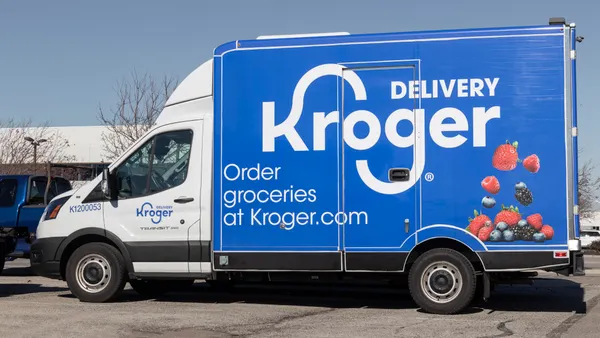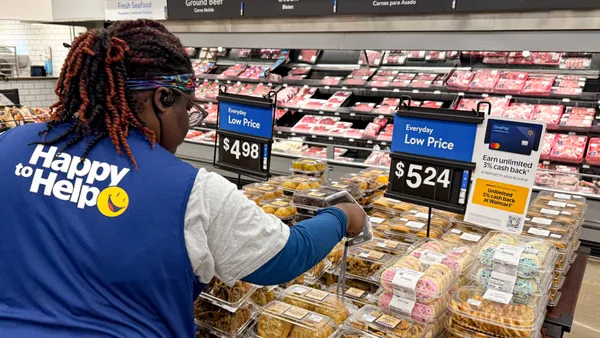Dive Brief:
- United Natural Foods, Inc. (UNFI) has seen double-digit sales growth over the past two weeks as consumers stock up on products amid the coronavirus outbreak, CEO Steven Spinner said during the company’s second quarter earnings call Wednesday. Spinner said UNFI expected sales to be high for 300 to 400 pantry items, but increases are coming throughout the store.
- The company revised its guidance for adjusted EBITDA and earnings per share for fiscal 2020 due to the bankruptcies of three clients during the second quarter: Fairway Market, Earth Fare and Lucky’s Market. Those bankruptcies resulted in an operating loss of $33 million. UNFI now expects earnings to range between $520 and $560 million, a reduction of $40 million at the midpoint. Its net sales forecast of $23.5 to $24.3 billion remains unchanged.
- UNFI officials said the sale Cub Foods, originally forecast for early this year, may not happen until the end of this year. “You don’t have to be a rocket scientist to see this is a really tough environment to sell retail,” Spinner noted. The distributor is in the process of performing sale-leasebacks of 15 Cub locations, which are expected to net an estimated $170 million.
Dive Insight:
UNFI officials said the company’s lowered guidance for fiscal 2020 is due to the rapid-fire bankruptcies that happened earlier this year, not because of the sales boost it’s seeing from coronavirus-fueled buying. Still, the double-digit uptick, if sustained, could eventually offset its lowered outlook.
Spinner compared the surge to the period before Thanksgiving, noting the difference this time around is that retailers and suppliers didn’t have time to prepare. The sales spike began in coastal cities and has started to make its way into Midwestern markets, he said.
The results indicate consumers are eating more at home and staying away from restaurants. But a long-term boost is far from assured, Spinner noted, echoing the same wait-and-see outlook that executives from Target and Kroger have recently shared against the backdrop of an outbreak that’s advancing by the day, but whose ultimate impact remains unknown.
“We’re watching to see what happens,” Spinner said.
UNFI officials said suppliers are scrambling to keep up with demand, making delivery rates and restock schedules uncertain. In a note to clients Wednesday, analysts with Jefferies wrote that a race to fill stores means UNFI isn’t distributing as efficiently as it would like, elevating operating expenses. At this point, the buying surge’s impact on earnings may be minimal, the analysts noted.
For the quarter, UNFI reported net sales of $6.14 billion compared to $6.15 billion during the same period a year ago, with adjusted EBITDA falling $12 million, to $131 million. Among the various retail channels the company services, only its “supernatural” channel, which includes its largest customer, Whole Foods, grew sales over the past year.
The independent grocery channel, which saw sales drop from $675 million during last year’s Q2 to $631 million during this year’s, has proven particularly challenging for UNFI. Smaller grocers are struggling against rising competition and investment pressure, said Sean Griffin, UNFI’s chief operating officer. Business from the distributor’s largest 100 clients, meanwhile, is growing incrementally.
Officials said the Q2 results support UNFI’s decision to acquire Supervalu nearly two years ago. Although integrating the two companies has proven more complicated than anticipated, they noted the core thesis of selling a wider assortment of specialty and conventional products to a wider array of customers remains strong.
“Scale and differentiation are more important than ever,” Spinner said.
There’s still a lot of work to be done. The company is continuing to consolidate its distribution facilities, with five facilities now winnowed down to two. UNFI is next turning to Southern California, where it's selling off a distribution center in Auburn and recently added 1.2 million square feet of multi-temperature capacity to a facility in Moreno Valley.
Regarding the remaining retailers it acquired from Supervalu, UNFI says it’s still marketing 24 Shoppers locations, with plans to divest the chain by the end of fiscal 2020. Its increasingly gloomy outlook for Cub Foods, which is still the market leader in the Twin Cities area, and which UNFI wants to sell as a whole rather than piecemeal, indicates the wholesaler may not get the full value for the chain it originally hoped for.
The Jefferies analysts noted that while the sale-leasebacks generate funds to pay down UNFI’s debt, they ultimately devalue Cub Foods.
“We remain concerned that UNFI will be forced to hold onto its retail banners for much longer than expected or a fire sale might be [required],” they wrote.










